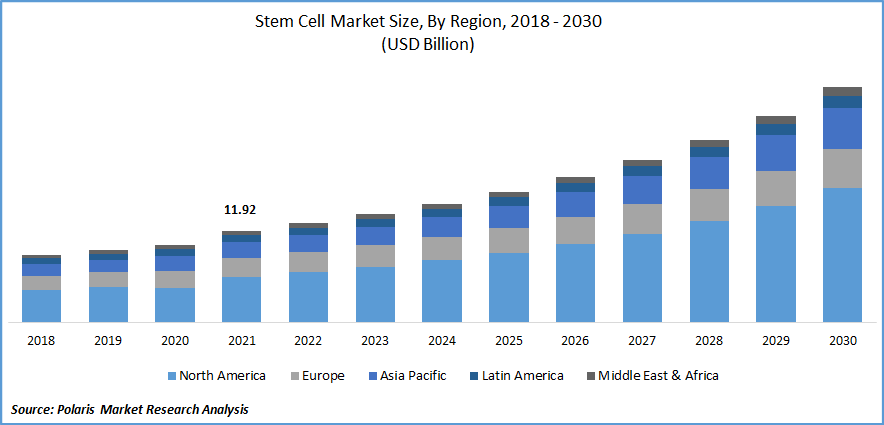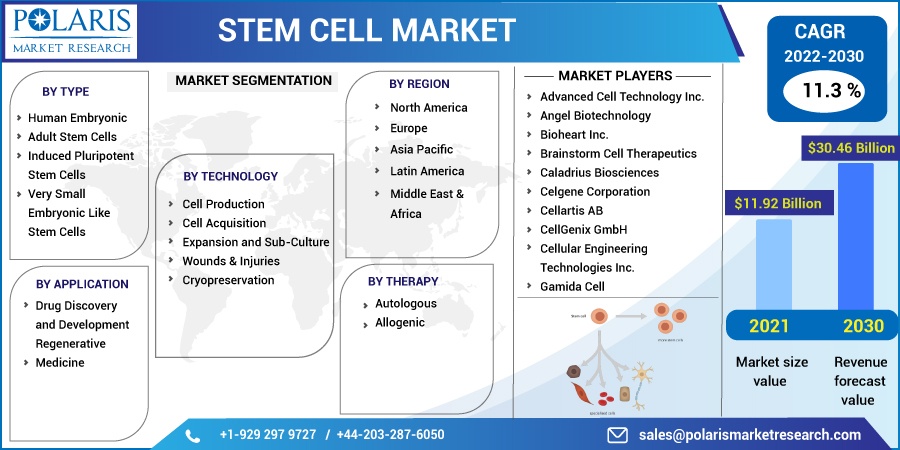
Stem Cell Market Share, Size, Trends, Industry Analysis Report, By Type; By Application (Drug Discovery and Development, Regenerative Medicine); By Technology; By Therapy; By Region; Segment Forecast, 2022 - 2030
- Published Date:Nov-2022
- Pages: 117
- Format: PDF
- Report ID: PM2725
- Base Year: 2021
- Historical Data: 2018-2020
Report Outlook
The stem cell market was valued at USD 11.92 billion in 2021 and is expected to grow at a CAGR of 11.3% during the forecast period. The rise in cell therapy production facilities, the growing number of precision medicine, and the rising number of clinical trials are some prominent factors responsible for market growth.

Know more about this report: Request for sample pages
An increasing number of clinical trials and approval of stem cell-based therapies from regulatory bodies will create many opportunities for this market. Additionally, growing number of cancer patients worldwide also spurs market growth.
Financial assistance from governments, private vendors, and NGOs drives the market's growth. For instance, National Stem Cell Foundation, a nonprofit, provides funds for research and clinical trials for adult stem cell therapies, education initiatives, and patient advocacy.
Covid-19 has positively influenced the market, as lung dysfunction was the primary cause of death during the pandemic. For instance, in January 2020, University of Miami researchers administered two infusions of stem cells to COVID-19 patients with lung injury. The results showed no noticeable side effects, and the therapy was effective.
Also, according to the article published by BioMed Central Ltd. (BMC), stem cells are safe and effective in treating severe COVID-19 disease, indicating significant potential.
However, limited awareness regarding appropriate treatment and ethical concerns for embryonic stem cells are some factors hampering the market growth. Also, decreased adoption due to high costs for the therapies can hinder the market's growth.
 Know more about this report: Request for sample pages
Know more about this report: Request for sample pages
Industry Dynamics
Growth Drivers
Increasing technological advancement in stem cell therapeutics, rising demand for stem cell banking, and a growing focus on developing personalized medicines are the primary factors driving the market’s growth.
Increased product launches by key market players are expected to drive the market over the forecast period. For instance, LifeCell, a healthcare service provider, introduced an advanced umbilical cord-stem cell collection kit on August 2017 that protects neonatal stem cells from environmental damage and temperature fluctuations.
Rising chronic disorders are also supposed to accelerate the market's growth. Chronic diseases are common health problems all over the world. One in every three adults worldwide suffers from a chronic condition. Chronic diseases, such as cancer, musculoskeletal and neurologic disorders, chronic injuries, and cardiovascular and gastrointestinal, can result in hospital treatment, long-term disability, decreased quality of life, and death.
Report Segmentation
The market is primarily segmented based on type, application, technology, therapy, and region.
|
By Type |
By Application |
By Technology |
By Therapy |
By Region |
|
|
|
|
|
Know more about this report: Request for sample pages
Adult Stem Cell Type Accounted the Largest Market Share in 2021
Adult stem cell offers benefits such as a capacity for autologous transformation, low risk of tumor formation, and availability of established treatment options. These collectively enhance the adult stem cell demand. These cells do not involve the destruction of embryos, which is the case in embryonic stem cells. Furthermore, there is no risk of graft rejection in the case of adult stem cells.
Therefore, the development of cell banking services and advances in bio preservation and cryopreservation are expected to increase the demand for adult stem cells further.
Cost-effectiveness and the expansion of stem cell banking have all contributed to the growth of this segment.
Regenerative Medicine Segment Acquires the Largest Market Share
Stem cells have played an important role in orthopedic regenerative medicine, particularly in healing the body without invasive surgery. Although orthopedic treatment applications in stem cell therapies are still evolving, recent research has shown promising outcomes expected to drive future market growth.
Additionally, the developed regenerative is useful for treating various blood disorders, heart diseases, diabetes, and vision loss. It has influenced the segment’s growth.
The increasing approvals for clinical trials of stem cell therapies for various diseases gain traction in the segment over the forecast period.
Cell Acquisition Segment is Expected to Hold the Significant Revenue Share
The invention of embryonic stem cells has covered the way to developing novel treatments for several diseases. These can be used to differentiate many cell types in the body. This cell is useful in the cell acquisition mechanism and plays important role in various types of cancer. The cell acquisition is bifurcated into bone marrow harvest, umbilical blood cord, and apheresis.
Thus, factors such as increasing prevalence of blood cancer and easy access to bone marrow transplantation therapy boost the segment’s growth during forecast period.
Allogenic Therapy Segment is Expected to Hold the Largest Revenue Share
The allogenic type creates a new immune system for the patients when the donor cells engraft in the recipient. Many malignant and non-cancerous disorders, such as acute leukemia, chronic leukemia, Hodgkin's lymphoma, Bone marrow failure syndromes, and others, can be treated by allogeneic stem cell transplants.
High pricing and development in stem cell banking have contributed to the growth of this segment. Furthermore, many cell therapy companies are refocusing on developing allogeneic cell therapy products. This, in turn, is expected to result in significant growth in this segment. For Instance, in June 2022, Immatics and Bristol Myers Squibb expanded their strategic alliance to develop gamma delta allogeneic cell therapy programs.
North America is Projected For the Largest Market Share
North America is expected to witness the highest growth over the forecast period owing to the strong biotechnology industry, the dominance of major key players, extensive R&D activities, and the promotion of personalized medicines.
Furthermore, growth can be attributed to a growing government initiative to promote stem cell therapies. For instance, the Canadian government invested approximately USD 7 million in regenerative medicine and stem cell research in March 2020. It will finance nine transnational projects and four clinical trials in the country to help the country's growth in the regenerative medicine sector.
Competitive Insight
Some of the major players operating in the global market include Advanced Cell Technology Inc., Angel Biotechnology, Bioheart Inc., Brainstorm Cell Therapeutics, Caladrius Biosciences, Celgene Corporation, Cellartis AB, CellGenix GmbH, Cellular Engineering Technologies Inc., Gamida Cell, Genea Biocells, Kite Pharma, Lonza, Osiris Therapeutics, PromoCell GmbH, STEMCELL Technologies Inc., Tigenix, and Waisman Biomanufacturing.
Recent Developments
In February 2021, American CryoStem collaborated with BioTherapeutic Labs Corp for the research and development of stem cells. The main purpose of this collaboration was to develop and improve protocols utilizing CRYO’s ATCell and BTL’s human umbilical cord-based product lines.
Stem Cell Market Report Scope
|
Report Attributes |
Details |
|
Market size value in 2022 |
USD 12.90 billion |
|
Revenue forecast in 2030 |
USD 30.46 billion |
|
CAGR |
11.3% from 2022 - 2030 |
|
Base year |
2021 |
|
Historical data |
2018 - 2020 |
|
Forecast period |
2022 - 2030 |
|
Quantitative units |
Revenue in USD billion and CAGR from 2022 to 2030 |
|
Segments Covered |
By Type, By Application, By Technology, By Therapy, By Region |
|
Regional scope |
North America, Europe, Asia Pacific, Latin America, Middle East & Africa |
|
Key Companies |
Advanced Cell Technology Inc., Angel Biotechnology, Bioheart Inc., Brainstorm Cell Therapeutics, Caladrius Biosciences, Celgene Corporation, Cellartis AB, CellGenix GmbH, Cellular Engineering Technologies Inc., Gamida Cell, Genea Biocells, Kite Pharma, Lonza, Osiris Therapeutics, PromoCell GmbH, STEMCELL Technologies Inc., Tigenix, Waisman Biomanufacturing. |
